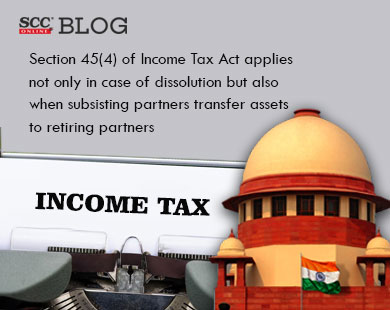Supreme Court: In an appeal filed by Revenue against the judgment passed by Bombay High Court, wherein the Court has dismissed the appeals and has confirmed the orders passed by the Income Tax Appellate Tribunal (‘ITAT’) deleting the short-term capital gains addition made by the assessing officer, the division bench of MR Shah* and M.M Sundresh, JJ held that the assets so revalued and the credit into the capital accounts of the respective partners can be said to be “transfer” and which fall in the category of “otherwise” and therefore, the provision of Section 45(4) inserted by Finance Act, 1987 shall be applicable. Thus, said that the impugned judgment passed by the High Court and that of the ITAT are unsustainable and set aside the same and restored the order passed by the assessing officer.
The question for consideration is the applicability of Section 45(4) of the Income Tax Act as introduced by the Finance Act, 1987?
The Court referred to Section 45 and said that the object and purpose of introduction of Section 45(4) was to pluck the loophole by insertion of Section 45(4) and omission of Section 2(47)(ii). While introduction to Section 45(4), clause (ii) of Section 2(47) came to be omitted. Earlier, omission of clause (ii) of Section 2(47) and Section 47(ii) exempted the transform by way of distribution of capital assets from the ambit of the definition of “transfer”. The same helped the assessee in avoiding the levy of capital gains tax by revaluing the assets and then transferring and distributing the same at the time of dissolution. The said loophole came to be plucked by insertion of Section 45(4) and omission of Section 2(47)(ii). It also noted that the word used “or otherwise” in Section 45(4) is very important.
The assessee submitted that unless there is a dissolution of the partnership firm, and there is only transfer of the amount on revaluation to the capital accounts of the respective partners, Section 45(4) of the Income Tax Act shall not be applicable. The Court said that the amended Section 45(4) of the Income Tax Act inserted vide Finance Act, 1987, by which, “or otherwise” is specifically added, the aforesaid submission on behalf of the assessee has no substance.
In the present case, the assets of the partnership firm were revalued to increase the value by an amount of Rs. 17.34 crores on 01-01-1993 and the revalued amount was credited to the accounts of the partners in their profit-sharing ratio and the credit of the assets’ revaluation amount to the capital accounts of the partners can be said to be in effect distribution of the assets valued at Rs. 17.34 crores to the partners. During the years, some new partners came to be inducted by introduction of small amounts of capital and the said newly inducted partners had huge credits to their capital accounts immediately after joining the partnership, which amount was available to the partners for withdrawal and in fact some of the partners withdrew the amount credited in their capital accounts.
Relying on the ruling in in CIT v. Hind Construction Ltd., (1972) 4 SCC 460, it was argued before the Court that unless there is a dissolution of the partnership firm, and there is only transfer of the amount on revaluation to the capital accounts of the respective partners, Section 45(4) of the Income Tax Act shall not be applicable.
The Court, however, rejected the submission and observed that the word “otherwise” used in Section 45(4) takes into its sweep not only the cases of dissolution but also cases of subsisting partners of a partnership, transferring the assets in favour of a retiring partner.
The Court noted that the decision in CIT v. Hind Construction Ltd., (1972) 4 SCC 460. was a pre-insertion of Section 45(4) of the Income Tax Act inserted by Finance Act, 1987 and in the earlier regime – pre-insertion of Section 45(4), the word “otherwise” was absent. Therefore, in the case of Hind Construction Ltd. (supra), this Court had no occasion to consider the amended inserted Section 45(4) of the Income Tax Act and the word used “otherwise”. Thus, for the purpose of interpretation of newly inserted Section 45(4), the decision in Hind Construction Ltd. (supra) shall not be applicable and/or the same shall not be of any assistance to the assessee. Further, the Court affirmed the view taken by the Bombay High Court in the case of Commissioner of Income Tax v. A.N. Naik Associates, 2003 SCC OnLine Bom 688.
Therefore, it was held that the assets so revalued and the credit into the capital accounts of the respective partners can be said to be “transfer” and which fall in the category of “otherwise” and therefore, the provision of Section 45(4) inserted by Finance Act, 1987 shall be applicable.
[CIT v. Mansukh Dyeing & Printing Mills, 2022 SCC OnLine SC 1618, decided on 24-11-2022]
*Judgment by: Justice M.R Shah.
Advocates who appeared in this case:
For Revenue: Advocate Rupesh Kumar;
For Assessee: Advocate Kaustubh Shukla.
*Apoorva Goel, Editorial Assistant has reported this brief.






